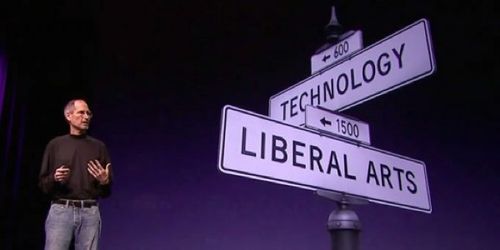February 26, 2021
. . .
| “ | It is in Apple’s DNA that technology alone is not enough—it’s technology married with liberal arts, married with the humanities, that yields us the results that make our heart sing. | ” |
| — Steve Jobs, Keynote Address, March 2011 | ||
My role at Middle Georgia State University has always been a bit ambiguous. Yes, I was hired as a tenure-track faculty member in the Division of Humanities at the former Macon State College in 2002, but as the institution grew and changed, my identity remained in the interstices even if my practical responsibilities were clear. As an Assistant Professor, then Associate, and finally a full Professor, I maintained my teaching, scholarship, and service duties, but has only been post-tenure that my vision as a scholar has come into focus.
My scholarly interests lie in a liminal space between English and Media Studies, or between the content and the containers of the liberal arts. My Ph.D. work and passion lies in traditional literary studies, but since coming to middle Georgia, I have grown increasingly aware of the technologies that define and shape what we call art, culture, knowledge. If I were pressed to name to my professional identity, I might choose Digital Humanist—a hacker scholar whose interests seek ways of using the computer to reconsider the past as we look toward the future of liberal arts in higher education. My work over the last five years exemplifies this new focus.
One of the tenets of the liberal arts education that has always resonated with me is its goal of creating a critical and engaged citizenry. The idea of employing one’s knowledge and enthusiasm in order to positively influence one’s communities is not only the at the foundation of democracy, but also at the heart of my professional endeavors. Networked technologies offer such promise in helping us realize this goal, only if we can avoid the increasingly obvious dangers of what Donna Haraway called the “infomatics of domination”: the isolating echo chambers or pulpits for want-to-be autocrats that tend to rouse our baser instincts.[1] Technology must be embraced in a way that allows for a democratic and open participation in building community knowledge and institutions that supports a community’s continued health and growth.
Much of my professional life over the last few years has revolved around what is arguably the most enduring, successful, and well used digital humanities ever undertaken: Wikipedia. I became a Wikipedian over a decade ago, but it has only been recently that I discovered it usefulness in supporting my work as an educator and scholar. In recent years I have authored, co-authored, or significantly improved at least a dozen articles, mostly centered on the life and work of Norman Mailer. Some of these articles are original, some began as student projects, and some were stubs that needed expansion.
. . .
notes
- ↑ See Haraway, Donna (1985). "A Cyborg Manifesto". In Wardrip-Fruin; Montfort. NMR. p. 515–527. See also A Cyborg Manifesto, “A Cyborg Précis,” and “Haraway Revisited”.
